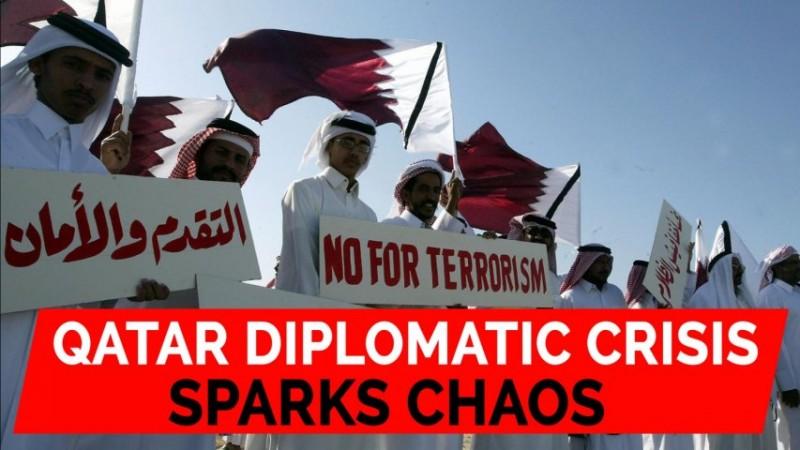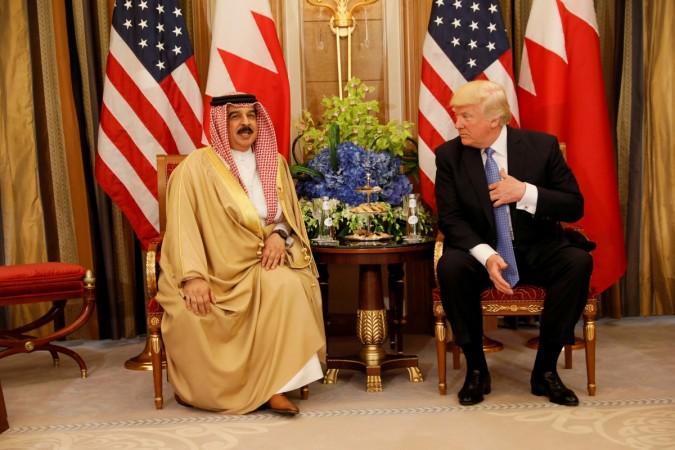
The Saudi Arabia-Qatar crisis is seeing addition of latest chapters with each passing day. Following the isolation of Qatar by a number of Arab countries including the regional powerhouse Saudi Arabia and the US entering a jet deal with the Qataris despite US President Donald Trump backing Qatar's isolation, now an adviser to Saudi's royal court has revealed that Qatar and Libya had plotted to assassinate late Saudi king Abdullah bin Abdulaziz al-Saud in the past. This, now, could make things even worse in West Asian politics.
Saud Al-Qahtani, Royal Court Adviser and Supervisor General of the Center for Media and Affairs Studies, said in a series of tweets on Thursday (June 15) that late Libyan dictator Muammar Qaddafi and Qatar's Emir Hamad bin Khalifa Al-Thani had reached an agreement to kill the Saudi king, who passed away in 2015, several years ago.
'Qaddafi had a fallout with the Saudi royals at Arab summit'
Al-Qahtani even said that the Qatari-Libyan plots were part of a series of others against Saudi Arabia. He said it had its beginning in 2003 at the Arab summit held in Sharm el-Sheikh in Egypt. There, the two late leaders of Saudi Arabia and Libya had a heated exchange of words in connection with the Iraq war which had started that month. Qaddafi had slammed Abdulaziz, who was the crown prince then, for seeking the USA's protection in the Gulf War. The Saudi leader had responded in equal harsh terms and had even asked Qaddafi who had brought him to power, indicating the role of the West.
The fallout of this was extreme as Qaddafi, an enemy of the US, turned to the Saudi dissidents in London but when he did not get the response from them, he turned to the Emir of Qatar, a country which has gradually grown as a strategic competitor to Saudi Arabia.
'Qatar emir had responded to Libyan dictator's wish'
The emir, Hamid bin Khalifa al Thani, currently the Father Emir, agreed to hold a meeting between the intelligence establishments of the two countries in Doha. The Qatari representatives, however, tried to convince Qaddafi's men that the plot was difficult and had it backfired, the repercussions could be serious. When the Libyans were disappointed, the Qatar Emir made a personal visit to Qaddafi and regretted what had transpired at the meeting and committed to the Libyan leader's aims, the Saudi adviser revealed further.
The emir then asked the Saudi dissidents in London to get involved in the plan and Saad al-Faqih, the head of the Movement for Islamic Reform in Arabia, assured that assassinating the Saudi king was not unachievable and said once the plot was successful, the collapse of the regime by the "jihadists" would be a matter of time. Al-Fqih has also been accused by the Americans of maintaining relations with the Al Qaeda since 1998.
Al-Qahtani has said that he would reveal more about the episode in the coming days but whatever he has said so far is enough to worsen the diplomatic row which has hit West Asia over the last few weeks.
Qatar had shown the audacity of emerging as a challenger to Saudi after its oil and natural gas reserves saw its economic fortunes swelling up by multiple times, making Riyadh and other traditional hotspots of the region envious. The Saudis finally decided to hit back by imposing a complete blockade on Qatar and the post-Qaddafi Libya, too, joined it in boycotting Doha.
But can there be really a war against Qatar?
So, could the latest revelation mean that the Saudi-Qatar diplomatic row reaching a point of no return? Is a war the only solution to end the row?
A lot of factors will neutralise the possibility of an outright war.
First, Qatar, although had been boycotted by the Saudis and some other countries, has its own allies in the region and Doha will look to cultivate them in its time of adversity. Qatar has an ally in Iran and also set up trading terms with Israel. Turkey has said it wants to resolve the dispute while some countries in Africa have taken a neutral stand on boycotting Qatar despite pressure from the Saudi camp. Morocco, too, has claimed to have sent food aid to Qatar while other Gulf States like Oman and Kuwait have treated the row with a balanced approach. So, Qatar is not alone to be one-sidedly bullied by the Saudis and their allies.

The second is the US factor. Despite the American President Donald Trump's defending the isolation of Qatar, his administration went ahead with a jet deal with the Qataris, making it evident that Washington will not alienate one of its biggest allies in West Asia under any circumstances. Qatar is home to a huge American airbase and the US will not internalise West Asia's regional politics to hit its own interests. So, an invasion of Qatar will face a road blockade from the US.
Third, Qatar has already made a name in the diplomatic world. It has backed anti-establishment forces in various countries of the region during the Arab Spring in the early 2010s, something which had infuriated the Saudis even more. Qatar's history as once-remote shelter for Islamists also made it an important party whenever the international community wanted to deal with extremist groups like Hamas, Chechen separatists, Taliban or members of the Muslim Brotherhood. So, while Qatar made a lot of enemies, it also succeeded in making a space for itself in the world of diplomacy which makes it difficult to even the powerful Saudis to run over it at will.
Finally, Qatar has a big economic significance as well, thanks to its huge gas reserves. Its size doesn't really matter for it controls the world's biggest gas reserves and any major regional crisis could have a lasting impact on the global economy besides the regional one. In fact, Qatar can also retaliate by turning off the gas pipes to its hostile neighbours.
The Qatar crisis looks to be far from over at this moment for the tiny country is an important regional player. A war is not really an option for the Saudis even if they would have loved to demolish Qatar but behind-the-scenes manipulation to effect a change of guard in Doha's palace could always be a possibility. It ultimately gets reduced to the finer diplomatic moves to end the crisis once and for all.
Meanwhile, the world can look forward to more revelations from Al-Qahtani that can stoke more fuel in the row.

















